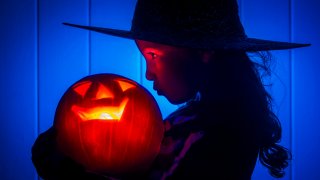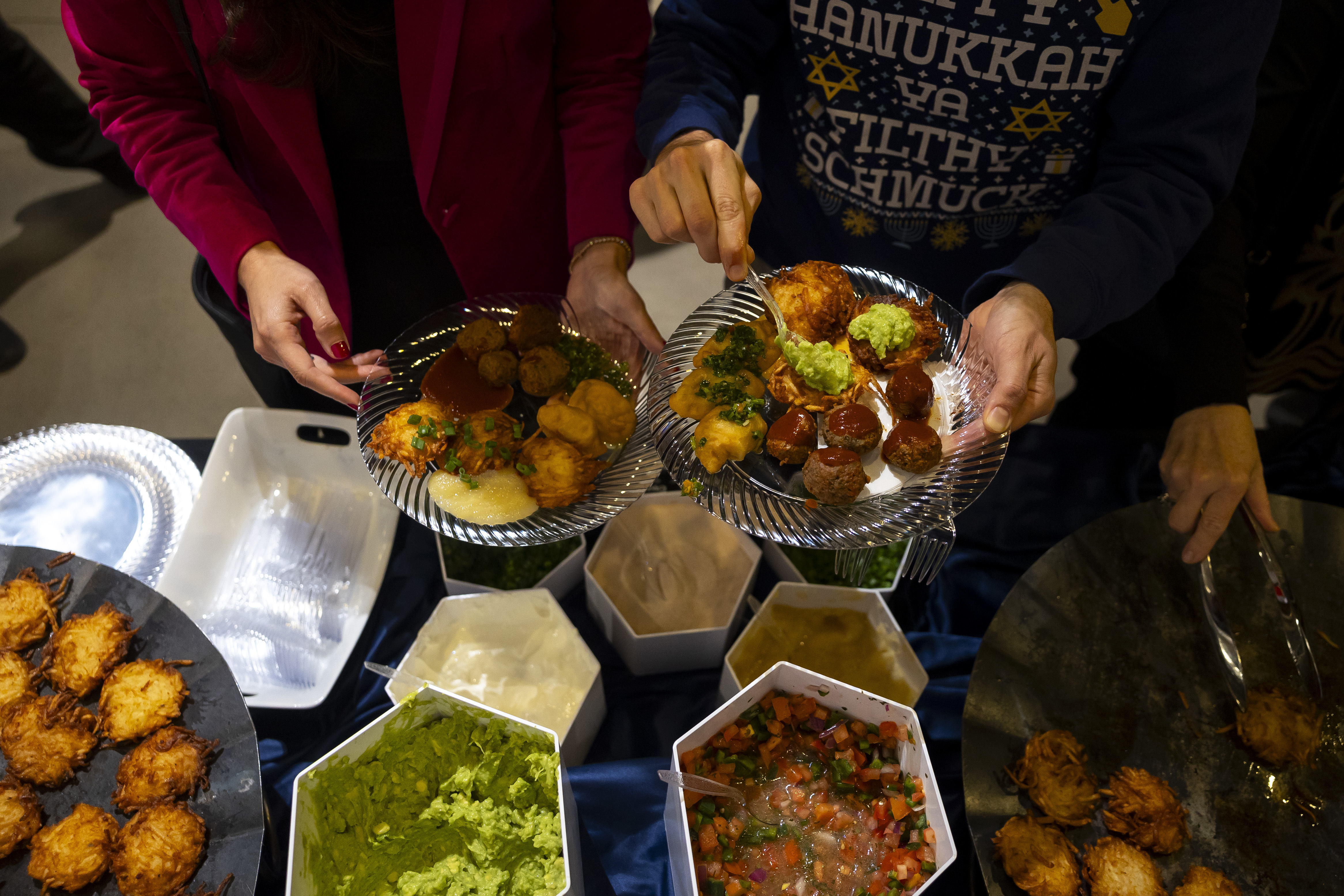
How much do you really know about Halloween?
Even after all these years, the haunted holiday remains a bit of a mystery — which is why we've rounded up some fun Halloween facts to teach you (and everyone else) a thing or two.
We've covered all the bases here. Below, learn the history of beloved Halloween traditions like trick-or-treating, homemade costumes and carved (and no-carve) pumpkins came to be. But that's not all: Get a taste of everyone's candy-eating habits, along with a look behind your favorite Halloween movies and songs.
They’ll come in handy, no matter what Halloween throws your way. Use ‘em to break the ice at a costume party, study them before a round of Halloween trivia, list off a few not-so-obvious Easter eggs about the scary movie you’re watching or incorporate bits of trivia into the caption of your annual Instagram post.
Get Tri-state area news delivered to your inbox.> Sign up for NBC New York's News Headlines newsletter.
Now, take a moment to read over these fun and festive facts, then memorize a few standouts to surprise and spook everyone who crosses your path on October 31.
The White House was first decorated for Halloween in 1958
Mamie Eisenhower decorated the White House for Halloween for the first time. She decked out the State Dining Room in twinkle lights, shocks of dried corn, jack-o'-lanterns and autumnal flower arrangements for a lunch for wives of staff members. Things took a spooky turn outside the dining room, though: Black cats, owls, witch heads and goblins hung from chandeliers in the foyer.
Holidays
From gift guides to local events, we're here to help you celebrate in style
Americans spend more than $100 on Halloween
And it's not going down anytime soon. In 2022, the National Retail Federation estimated that Americans would spend an average of $100 on costumes, candy, decorations and greeting cards — just short of last year's estimate of $103.
Spending is expected to increase across the board, except spending on greeting cards is taking a slight dip this year. Looks like we're going digital this Halloween then!
Jack Nicholson's divorce inspired a scene in "The Shining"
There's a scene in "The Shining" that writers — including Nicholson — know all too well: Wendy approaches Jack at his typewriter and he scolds her for trying to get in the way of his writing process. Nicholson later revealed that his character's reaction, although exaggerated, stems from his own personal experience.
"That scene at the typewriter — that’s what I was like when I got my divorce. I was under the pressure of being a family man with a daughter and one day I accepted a job to act in a movie in the daytime and I was writing a movie at night and I’m back in my little corner and my beloved wife, Sandra, walked in on what was, unbeknownst to her, this maniac — and I told Stanley [Kubrick] about it and we wrote it into the scene," the actor told The New York Times.
William Shakespeare wrote the "Song of Witches"
“Double, double toil and trouble; Fire burn and caldron bubble” is from William Shakespeare’s “Macbeth.” A trio of witches recite the poem as they scheme over a bubbling cauldron and it's been associated with witches ever since.
People used to carve turnips, not pumpkins
Initially, the Irish and Scottish carved turnips as a way to remember deceased souls. When they immigrated to the U.S., they realized that pumpkins were much easier to carve and the rest, as they say, is history.
The most-Googled costume is a witch
Classic Halloween costumes never go out of style. Here are the most popular children’s Halloween costumes in 2022 (in order), according to Google:
- Witch
- Spiderman
- Dinosaur
- "Stranger Things"
- Fairy
- Pirate
- Rabbit
- Cheerleader
- Cowboy
- Harley Quinn
- Clown
Halloween was once known as "Black Halloween"
Before costumes and trick-or-treating, Halloween was a night for pranking. The pranks eventually got out of control and in 1933, vandals caused millions of dollars of damage across the U.S., leading many people to refer to it as “Black Halloween.”
Trick-or-treating began in Canada (possibly)
The origins of trick-or-treating are still up for debate. Although some believe trick-or-treating dates back to medieval times, Henry Ansgar Kelly, a research professor specializing in medieval and renaissance studies at UCLA, said it may have started in Canada during the early 1900s as a way to deter pranksters from wreaking havoc.
Michael Myers was inspired by Captain Kirk
Netflix's "The Movies That Made Us" revealed the connection between "Halloween" and "Star Trek." The Michael Myers mask in the movie was actually reconstructed from an old Captain Kirk mask. Tommy Wallace, the film’s production designer, shaved off the eyebrows and sideburns, then dyed the hair brown to give it its signature Michael Myers look.
Halloween isn't Day of the Dead (and vice versa)
While the Day of the Dead (Día de los Muertos) is often associated with Halloween, it shouldn't be. The Mexican holiday dates back more than 3,000 years and is a time to honor deceased loved ones. That said, it shouldn't be associated with costumes, candy and other Halloween traditions.
Halloween generates billions of dollars
Around $10 billion, to be exact. The most recent survey from the National Retail Federation predicted that Halloween would generate $10.6 billion in 2022, up from 10.14 billion in 2021. Costumes account for most of that, with kids and adult costumes expected to exceed $2.9 billion.
All Saints Day is not All Souls Day
Celebrated on November 1, All Saints Day honors the death of Catholic saints and loved ones. All Souls Day, on November 2, is observed to pray for souls of the faithfully departed that remain trapped in purgatory in hopes they'll be admitted to heaven.
Halloween may have started in 600 A.D.
Many experts believe that Halloween stems from Samhain, a Gaelic festival to celebrate the end of summer. The first known celebrations of Samhain are said to have occurred around 600 A.D., making Halloween more than 3,500 years old.
Retailers made Halloween popular
From 1909 to the 1940s, the Dennison Manufacturing Co., a paper goods manufacturer located in Framingham, Mass., was one of the leading producers of Halloween costumes, invitations and decorations in the U.S. The rise in available Halloween-related goods spurred the popularity of the holiday.
Trick-or-treating took off in the 1930s
Lisa Morten, author of “Trick of Treat: The History of Halloween,” said the first official mention of trick-or-treating as a Halloween activity in the U.S. was published in the November 1939 issue of "American Home" magazine.
Americans love pet Halloween costumes
According to the National Retail Federation, one in five people planned to dress up their pet for Halloween in 2021.
The most popular pet Halloween costumes in 2022 are as follows:
- Pumpkin
- Hot dog
- Bat
- Bumblebee
- Witch
The Headless Horseman isn't linked to Halloween
Though everyone associates Halloween with “The Legend of Sleepy Hollow,” the original Washington Irving short story doesn’t mention Halloween even once. It’s the 1949 Disney movie, “The Headless Horseman,” that makes the connection between the two.
The first guide to Halloween came out in 1897
Before there were magazine articles, TV segments and other helpful how-to's, Americans relied on annual Halloween guides to answer their top questions. The first official Halloween party guide, titled "Halloween: How to Celebrate It," was published in 1897.
Stingy Jack inspired jack-o'-lanterns
"Stingy Jack," a drunk and deplorable person, cheated death three times and, each time, tricked the devil out of taking his soul. When Jack finally died, he wasn’t allowed into heaven and the devil banned him from hell. Instead, Jack was forced to wander Earth for all eternity using an ember-lit gourd to light his way.
There are millions of trick-or-treaters
In 2019, the U.S. Census estimated that there would be upwards of 41 million trick-or-treaters between the ages of five and 14. And, as of 2020, the number of potential stops for those trick-or-treaters was a whopping 126.8 million. That’s a lot of candy.
Europe doesn't celebrate Halloween like the U.S.
Even though Halloween was brought to the U.S. from Irish and Scottish immigrants, the rest of Europe didn’t begin celebrating the holiday until decades later. Although many European countries now celebrate the holiday, it hasn't been quite as commercialized as the U.S.
It wasn't always called "Halloween"
There are several theories about the origin of the word “Halloween.” According to the Oxford English Dictionary, "Halloween" stems from “All Hallow’s Eve.” However, in 1773, the Scottish began calling it, “Hallow-e’-en.”
Then, a few years later, poet Robert Burns put the words together in the poem titled “Halloween” and we’ve been writing it that way ever since.
Halloween postcards used to be a thing
From 1905 to 1920, more than 3,000 Halloween postcards were mass-produced. For years, people popped Halloween greetings in the mail until the telephone became the preferred method of communication.
Everyone loves candy (like a lot)
So many Halloween activities, so little time! In 2022, the National Retail Foundation said that passing out candy was the most popular way to spend Halloween— and understandably so. Other common ways that people celebrate include:
- Decorating their home or yard
- Dressing up in costume
- Carving pumpkins
- Throwing or attending a party
People used to carve other fruits
Think beyond the gourd! U.S. magazines and Halloween guides from the late 1800s offered tips on how to carve apples and cucumbers in addition to jack-o’-lanterns.
Candied apples were a total mistake
The beloved Halloween treat is said to have been invented by William W. Kolb, a New Jersey confectioner, in 1908. The candy maker supposedly dipped an apple into a cinnamon glaze as an experiment and discovered that patrons loved them.
Rhode Island is home to 6,000 jack-o'-lanterns
The annual Jack-O-Lantern Spectacular held at the Roger Williams Park Zoo in Providence, Rhode Island displays more than 6,000 jack-o’-lanterns during their annual festival. It's one of the largest displays in the country, drawing roughly 115,000 to 140,000 visitors each year.
Black cats get a bum rap
Black cats are undeservedly associated with bad luck. Their reputation dates way back to the Middle Ages when people considered them a sign of the devil. Hundreds of years later, black cats became the object of fear and scorn after being linked to witches and black magic.
Candy corn has been around since the 1800s
Originally dubbed “Chicken Feed,” candy corn became popular once the Goelitz Company took over production in the late 1800s. Love it or hate it, the sugary-sweet treats become a Halloween staple in the 1950s.
Transylvania is located in the U.S.
If you love vampires and want to visit Transylvania, you need only book a trip to North Carolina. Known as the “Land of Waterfalls,” (not vampires, who knew?), Transylvania County is located in western North Carolina and is home to roughly 34,000 residents. The official Bram Stoker version is in Romania.
Halloween isn't just for kids anymore
Once upon a time, Halloween was all about kids and while that's still true, adult participation is growing year over year. According to the NRF, Roughly 55% of households without children planned to celebrate Halloween in 2021 (up from 49% back in 2020). Annual spending on adult Halloween costumes was also predicted to be around $1.5 billion.
The most popular Halloween candy is ...
Are you ready for this one? According to research by YouGov, the most popular Halloween candy is (drum roll, please) M&Ms! Reese's Peanut Butter Cups come in a close second. Interestingly enough, their findings show kids ages 8 to 14 prefer the two in reverse order. Go figure!
Here is the most popular Halloween candy for adults, ranked:
- M&Ms (original)
- Reese's Peanut Butter Cup
- Kit Kat
- Peanut M&Ms
- Butterfinger
- Snickers
- Twix
- Milky Way
- Hershey's Milk Chocolate Bar
- Reese's Pieces
This story first appeared on TODAY.com. More from TODAY:



